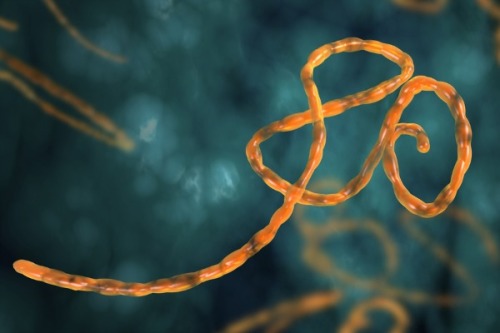Ebola Fear-Mongering Comes from Creationists Fearful That Virus Will . . . Ahem. . . "Evolve"
 |
| Ebola |
No one ever said that all sides to an argument had to maintain logical consistency. All that an opponent needs is to get its adherents elected to local school boards and textbook committees. Sadly, paranoia and fear are far more virulent and contagious in a society then any virus. I reflected on this last night after reading the column of a Fox network "medical specialist," who squandered the opportunity to educate the public about the actual transmission vectors of Ebola as a means of controlling panic and instead compared the single Ebola patient in the U.S. to 19th century typhoid Mary.
Not surprisingly, most of the commenters added to the column's fearful tone by describing apocalyptic scenes from epidemic-run-amok sci-fi flicks they had watched. And that really got me to thinking. What do people do when their non-science belief system has nothing of importance to say about an issue engaging the public's attention? Apparently, that empty space is stuffed to bursting with polyester pellets of fear, xenophobia and possibly even hatred. All those roiling emotions leave no room to even notice that accurate knowledge might be missing from the scenario and that every disease has its own, well defined characteristics. That is in fact why some people become epidemiologists and track such vital matters for the health of the entire planet, and why the President of the United States pays more attention to them than to sci-fi flicks.
Yes, now I finally get it. The high-decibel hysteria I'm seeing all over the Internet is all about filling up empty spaces. This Ebola epidemic has been a golden opportunity for the GOP base, the Creationists, and those still whining over the President's birth certificate to denounce Obama for "bringing Ebola to America", to denounce Obamacare, to denounce Africa for being not only the birthplace of humankind but of a whole host of other living-kinds as well.
But what can the real experts tell us? Firstly, if we don't want to see Ebola mutate, then we had better get as many troops to West Africa as possible to stop the epidemic in its tracks. Mutations are a function of cell divisions over time. And why are we so sure that such practices will work? For one thing, Nigeria stopped the spread of Ebola in their country by quickly isolating those who were infected. Medical epidemiologist, Gerardo Chowell-Puente offered informed comment on Slate:
Ebola’s reproductive rate is significantly lower than either measles in the prevaccination days or the Spanish flu, but it’s high enough that Ebola will not peter out on its own. Our 2004 work, which produced the first estimates for Ebola’s reproductive rate by using mathematical modeling and epidemiological data from the West African outbreaks, found that each case of Ebola produced 1.3 to 1.8 secondary cases on average. But at least this is essentially the same virus we saw previously. It hasn’t become more transmissible in the more than 10 years it was lying low—and humankind has experience in dealing with it. We know that it takes substantial contact for Ebola to spread: Someone has to touch or ingest infected body fluids. So last time, health care workers contained the outbreaks by isolating infectious individuals; providing more gloves, face masks, and gowns in hospitals and clinics—and requiring nurses, doctors, and other health care providers to wear them; having trained personnel handle the bodies of the deceased (rather than allowing family members to commune with the body, as favored by many West African cultural traditions); and tracing contacts from infectious individuals immediately to isolate potentially new infectious cases.RELATED POSTS:
To break the chain of the current Ebola outbreak, our numbers show that health care workers need to halt about 50 percent of infectious contacts by effectively isolating people who are infectious or vaccinating at least the same fraction of the population. . . The time that elapses between the first Ebola case and the generation of secondary cases is about two weeks. This should allow for plenty of time to identify those who are sick and protect people who might come in contact with them. Individuals with Ebola are only contagious and able to transmit the virus when they are showing symptoms, which occurs about a week after they are first exposed to the virus. This likely explains why Nigeria has been able to break the chain of transmission, as Nigerian health authorities detected the first Ebola case in their country only three days after that person’s arrival from Liberia by airplane and acted quickly to isolate infectious individuals and trace their potential contacts. Nigeria has observed 20 cases where Ebola was transmitted, with no new cases reported as of Sept. 8, 2014. . .Math and history show us that decisive efforts to isolate those who are infected with Ebola and to follow up with potential contacts quickly can help to get an outbreak under control.
- An Ebola Patient and a Lesson in Racial Profiling that I Hope Texans Never Forget
- Ebola Mis-steps or Is Texas Presbyterian Hospital's ER Run by Computerized Robots?
- The Real Reason the Man Infected with Ebola not Admitted to Dallas Hospital
- Re-Thinking Ebola Now that It's in Dallas (My Backyard)
- Ebola Patient Died Three Days Ago -- Why the Cover-Up?
Comments